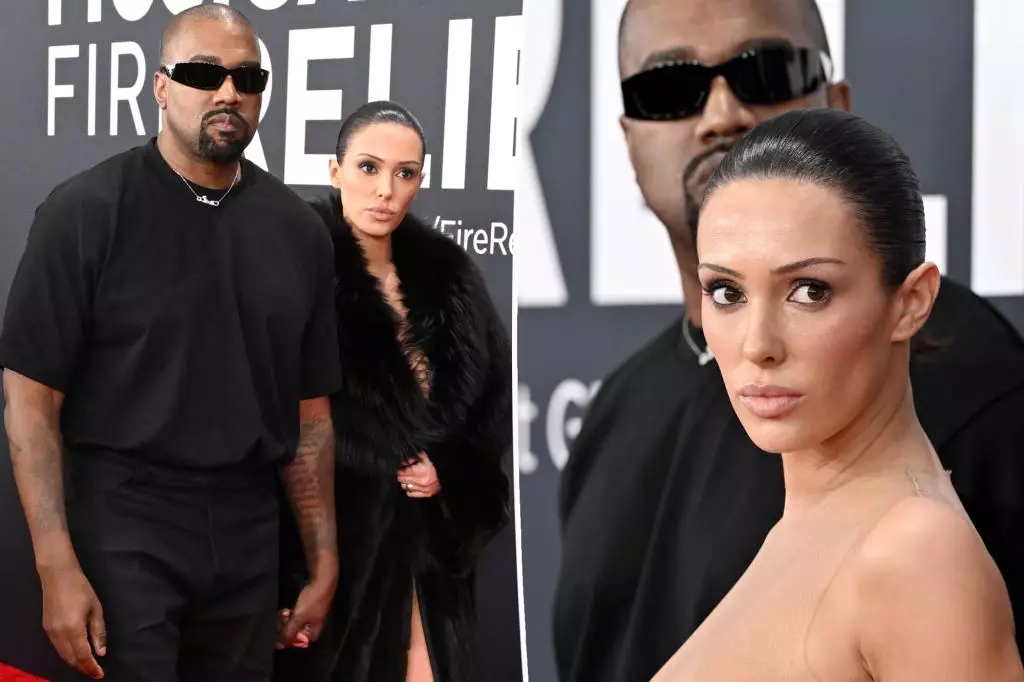Kanye West, a figure who is no stranger to making headlines, has once again captured public attention following his wife Bianca Censori’s provocative appearance at the Grammy Awards. Recent footage obtained by TMZ reveals West’s unabashed confidence as he interacts with paparazzi following Censori’s daring red carpet stunt. This latest incident serves as a case study in celebrity culture, media manipulation, and societal reactions to public displays of intimacy and individuality.
Kanye West’s recent behavior exemplifies a strategy where shock value reigns supreme. As he can be seen gloating to the cameras, instructing them to “Ask me how it was to beat the Grammys,” it’s clear he capitalizes on controversy to generate buzz. The phrase “We beat the Grammys,” delivered with a dose of humor alongside Censori, encapsulates his approach to self-promotion. The interplay between West and Censori signifies not merely a husband and wife dynamic, but a tactical maneuver in the realm of public relations, drawing the media’s attention while simultaneously asserting their influence.
Censori’s eye-catching entrance at the Grammys, empowered by a transparent ensemble, amplifies the narrative. By choosing to wear what has been described as an “invisible dress,” she effectively turned the red carpet into a runway of discourse concerning body autonomy, self-expression, and the boundaries of appropriateness. In a moment meant to impress and shock, she succeeded in catapulting herself into the spotlight, showcasing not just her fashion statement but also the willingness to challenge societal norms.
However, not all reactions have been supportive. The backlash to Censori’s attire has materialized in various forms. Photographer Chiara Glionna’s remarks articulated a sentiment that often accompanies such displays—seeing a woman’s nudity as an “easy win” for male attention can reinforce problematic power dynamics. Glionna’s critique underscores a larger conversation about the portrayal of women in media and the implications of objectification in the guise of empowerment.
With this critique, Kanye’s response—sharing Glionna’s comment and labeling it “easy win”—serves to underscore his controversial stance. By engaging with dissenting opinions in a dismissive manner, he positions himself as an unwavering figure in the face of criticism, thus complicating public perceptions of his character.
The couple’s antics serve not only as entertainment but also as a vivid marketing ploy. West’s ability to pivot attention from the Grammy stage to promoting his latest Yzy fashion line demonstrates a keen understanding of the interconnectedness between cultural phenomena and commercial endeavors. He has already leveraged Censori’s red carpet appearance to showcase subsequent designs, such as a sheer bodysuit, generating further conversation—and controversy—around their brand.
Moreover, the fact that LAPD sources indicated that Censori would not face legal repercussions for her attire only solidifies the idea that boundary-pushing can often lead to a lack of accountability, especially for celebrities. This aspect sheds light on the double standards that permeate discussions around celebrity behavior, raising questions about the societal endorsement of certain actions based solely on the individual’s public stature.
Kanye West and Bianca Censori’s recent actions at the Grammy Awards encapsulate the essence of modern celebrity culture—one prominently featuring the blend of spectacle, marketing, and dialogue surrounding societal norms. As they continue to navigate the complexities of fame, their choices will undoubtedly inspire both admiration and criticism, leaving an indelible mark on the landscape of cultural commentary.

